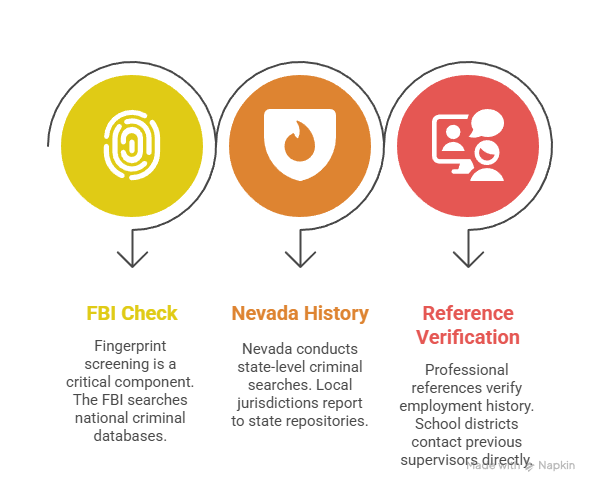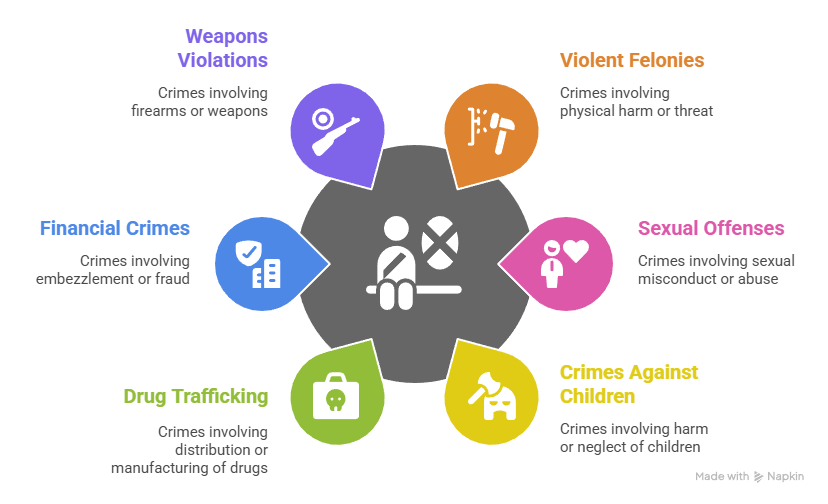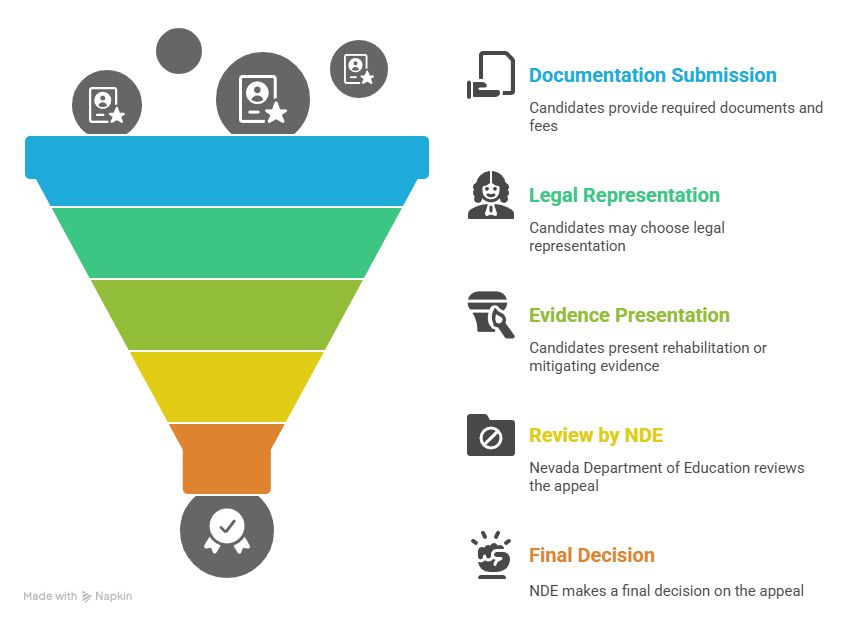Nevada K12 education background screening requirements mandate comprehensive checks for all school personnel through the Nevada Department of Education. All education workers must complete FBI fingerprinting, criminal history reviews, and credential verification before employment authorization in any Nevada school district.
Key Takeaways
- Nevada requires comprehensive background screening for all K12 education workers before employment begins
- The screening process includes FBI fingerprinting, state criminal history checks, and professional reference verification
- Certain criminal convictions automatically disqualify candidates from Nevada education positions
- Background screening typically takes 2-4 weeks once all documentation is properly submitted
- Both certificated teachers and classified support staff must meet Nevada's screening standards
- School districts cannot employ any education worker who has not completed required background screening
Nevada Education Background Screening Overview
Nevada maintains strict background screening standards for all K12 education workers. The Nevada Department of Education oversees these requirements. School districts must verify every candidate's suitability before employment.
The state uses multiple verification methods. Criminal history checks form the foundation of screening. Professional reference reviews add another layer. Educational credential validation ensures proper qualifications.
Nevada Revised Statutes Chapter 391 establishes mandatory screening protocols. School districts cannot bypass these requirements. The law applies to all education positions without exception.
Background screening covers full-time employees and part-time workers. Substitute personnel must complete the same process. Contractors with student contact also require screening. Even volunteers need background checks in certain situations.
The Nevada teacher background screening process protects students and maintains educational integrity. Schools depend on thorough vetting to create safe learning environments. Parents expect comprehensive screening of all school personnel.
Current requirements reflect both federal and state compliance standards. FCRA regulations guide the screening process. Nevada-specific education laws add additional protections.
Required Background Check Components
Nevada education workers must complete several distinct screening elements. Each component serves specific verification purposes. The combination provides comprehensive candidate assessment.
The Nevada school district hiring process incorporates all required screening components. Districts coordinate with state agencies for complete verification. Missing any component delays or prevents employment authorization.

FBI Criminal Background Check
FBI fingerprint screening represents the most critical component. Candidates must visit approved Nevada fingerprinting locations. Electronic submission systems process fingerprints quickly.
The FBI searches national criminal databases. Results typically arrive within 3-5 business days. Information goes directly to the Nevada Department of Education.
Proper identification is required at fingerprinting appointments. Candidates must pay fees at the time of service. Appointments should be scheduled promptly after job offers.
Nevada State Criminal History
Nevada conducts comprehensive state-level criminal searches. These searches cover Nevada court records and arrest histories. The Nevada Department of Public Safety processes these requests.
State searches often reveal more recent information than federal databases. Local jurisdictions report directly to state repositories. This creates more complete criminal history pictures.
Processing typically adds 1-2 weeks to screening timelines. However, the additional time ensures thorough verification. Nevada education officials review state results alongside FBI findings.
Professional Reference Verification
Education worker licensing in Nevada requires professional reference checks. Former employers must verify employment history and performance. References confirm candidate suitability for education positions.
School districts contact previous supervisors directly. They verify employment dates and job responsibilities. Performance evaluations may be requested for review.
Reference checks can reveal information not found in criminal databases. Professional conduct issues may surface during this process. Previous terminations or disciplinary actions become apparent.
Criminal History Disqualifications
Nevada maintains specific lists of disqualifying criminal offenses. These restrictions protect students and maintain school safety. Understanding disqualifications helps candidates assess their eligibility.
Automatic disqualifications apply to serious felony convictions. Violence-related crimes result in permanent employment bars. Sexual offenses create absolute disqualification from education work.
The following categories result in automatic disqualification:

- Violent felonies: Murder, assault, robbery, and similar crimes
- Sexual offenses: Any conviction involving sexual misconduct or abuse
- Crimes against children: Child abuse, neglect, or endangerment convictions
- Drug trafficking: Felony drug distribution or manufacturing charges
- Financial crimes: Embezzlement or fraud involving educational institutions
- Weapons violations: Serious firearms offenses or weapons on school property
Recent drug-related felonies also disqualify candidates. The five-year lookback period applies to most drug convictions. However, trafficking charges may result in permanent disqualification.
Misdemeanor convictions receive individual review. Factors include offense severity and recency. Multiple misdemeanors may indicate problematic patterns.
The Nevada Department of Education reviews each case individually. However, statutory requirements limit discretionary decisions. Appeal processes exist but rarely succeed without substantial rehabilitation evidence.
Application Process and Documentation
The background screening application follows structured steps. Candidates should begin early to avoid employment delays. Understanding requirements helps ensure smooth processing.
School districts typically initiate screening after conditional job offers. Some candidates complete preliminary screening during applications. The Nevada Department of Education provides detailed submission guidelines.
Required documentation includes government-issued identification and Social Security cards. Completed application forms must accompany all submissions. Employment history requires specific dates and supervisor information.
Educational transcripts verify academic qualifications. Professional licenses need current status verification. Out-of-state candidates may need additional credential authentication.
Processing Timeline and Fees
Standard processing takes 2-4 weeks from complete submission. Complex cases or incomplete documentation extend timelines. Rush processing options cost additional fees.
| Screening Type | Standard Fee | Processing Time | Expedited Option |
| Teacher Certification | $75-85 | 2-3 weeks | +$25 for 1 week |
| Support Staff | $65-75 | 2-3 weeks | +$20 for 1 week |
| Substitute Teacher | $45-55 | 1-2 weeks | +$15 for 3-5 days |
Payment methods include credit cards, money orders, and certified checks. Personal checks are not accepted. Some school districts reimburse successful candidates for screening costs.
Incomplete applications result in processing delays. Missing documentation requires resubmission. Fees are not refunded for incomplete applications.
Common Documentation Issues
Name discrepancies frequently cause processing problems. Marriage or legal name changes require additional documentation. Court orders, marriage certificates, or divorce decrees resolve naming issues.
Address history gaps complicate background verification. Candidates must provide complete residential histories. Typically, seven to ten years of addresses are required.
International background checks present unique challenges. Out-of-country criminal history requires special processing. Additional fees and extended timelines apply to international verification.
Position-Specific Requirements
Different education roles face varying screening requirements. All positions require basic criminal background checks. However, certain roles demand additional verification steps.
Certificated teachers undergo the most comprehensive screening. Teaching licenses require credential verification. Professional conduct reviews examine previous employment issues.
Administrative positions need additional financial background screening. Principals and superintendents face enhanced scrutiny. Their access to funds and sensitive information requires extra verification.
Support staff screening focuses on criminal history and references. Custodial, food service, and clerical workers follow standard protocols. However, their student access determines screening depth.
Substitute Teacher Requirements
Substitute teachers follow modified screening protocols. The process balances thorough evaluation with practical hiring needs. Districts need qualified substitutes available quickly.
Substitute screening typically processes faster than regular teacher screening. However, the same criminal history standards apply. Professional reference requirements may be reduced.
Emergency substitute provisions allow limited work pending full clearance. However, this requires direct supervision at all times. Full screening must be completed within specified timeframes.
Volunteer and Contractor Screening
Volunteers with regular student contact undergo similar screening to employees. One-time volunteers may qualify for abbreviated processes. The level of student access determines screening requirements.
Independent contractors providing school services need appropriate background checks. Maintenance, technology, and food service contractors face different requirements. Their specific duties and student interaction levels guide screening depth.
Athletic coaches and activity supervisors may need additional screening. Their extended student contact and travel responsibilities require enhanced verification. Background checks may include driving record reviews.
Out-of-State and Reciprocity Considerations
Nevada recognizes certain out-of-state background checks through reciprocity agreements. However, recognition varies by state and position type. Most transfers still require Nevada-specific screening components.
The Nevada Department of Education maintains current reciprocity state lists. Teachers from approved states may submit previous background results. This can expedite processing while ensuring Nevada compliance.
Interstate teacher mobility compacts facilitate some transfers. However, background screening requirements often exceed compact minimums. Nevada may require additional state-specific checks regardless of previous clearances.
Recent background checks from approved states receive preferential processing. However, "recent" typically means within the past 12 months. Older clearances usually require complete re-screening.
Ongoing Compliance and Renewal
Active Nevada education workers must maintain background screening compliance throughout employment. Periodic re-screening requirements vary by position and district policy. Understanding renewal requirements prevents employment disruptions.
Most certificated employees complete background renewal every five years. This coincides with teaching license renewal cycles. Support staff may face different renewal schedules based on district policies.
Districts coordinate renewal processes to minimize operational disruption. Group renewal processing often reduces individual costs. Early renewal reminders help employees maintain continuous clearance.
Workers must immediately report certain criminal charges or convictions. Failure to report disqualifying events results in immediate termination. The Nevada Department of Education provides specific reporting guidelines.
Reporting Requirements
New criminal charges must be reported within specified timeframes. Most districts require immediate notification of arrests. Convictions require reporting regardless of sentence or penalties.
Traffic violations typically do not require reporting unless they involve alcohol or drugs. However, commercial driver license holders face stricter reporting requirements. School bus drivers must report all moving violations.
Professional misconduct in other states requires Nevada reporting. Teachers cannot hide disciplinary actions by changing states. Interstate databases track professional conduct issues across jurisdictions.
Appeals and Reconsideration Process

Candidates with negative background screening results may request appeals. However, appeal success rates remain low without substantial supporting evidence. The process provides due process while maintaining safety standards.
Appeal applications require specific documentation and fees. Legal representation is permitted but not required. Supporting evidence must demonstrate rehabilitation or mitigating circumstances.
Automatic disqualifications rarely succeed on appeal. However, discretionary decisions may be reconsidered with new evidence. Character references and community involvement strengthen appeal cases.
The Nevada Department of Education reviews appeals within specified timeframes. Appeal decisions are typically final with limited further recourse. Reapplication may be possible after specified waiting periods.
Rehabilitation Evidence
Successful appeals often include comprehensive rehabilitation documentation. Completion of counseling or treatment programs demonstrates commitment to change. Community service and volunteer work show positive contributions.
Employment history since convictions provides evidence of stability. Letters from employers, counselors, and community leaders support appeals. However, automatic disqualifications rarely allow rehabilitation consideration.
Time elapsed since convictions affect appeal consideration. Longer periods without incidents strengthen cases. However, serious offenses may never qualify for reconsideration regardless of elapsed time.
Technology and Future Changes
Nevada continues modernizing background screening processes through technology improvements. Electronic fingerprinting has reduced processing times significantly. Online application systems streamline documentation submission.
Automated database searches improve accuracy and speed. Real-time updates provide current criminal history information. Interstate data sharing enhances verification across jurisdictions.
Future changes may include continuous monitoring systems. These would alert employers to new criminal activity during employment. However, privacy concerns and costs currently limit implementation.
The Nevada Department of Education regularly updates screening requirements. Federal law changes may necessitate state requirement modifications. Districts receive notification of requirement updates through official channels.
Mobile fingerprinting services may expand to rural areas. This would improve access for candidates in remote locations. However, security requirements must be maintained regardless of service location.
Conclusion
Nevada K12 education background screening requirements ensure comprehensive candidate evaluation while protecting student welfare. The process involves FBI fingerprinting, state criminal history checks, and professional verification, typically requiring 2-4 weeks for completion. Understanding position-specific requirements, maintaining proper documentation, and following established procedures helps candidates navigate screening successfully. All education workers must complete mandatory requirements before employment and maintain compliance throughout their Nevada education careers through periodic renewals and immediate reporting of relevant incidents.
Frequently Asked Questions
How long does Nevada education background screening take to complete?
Nevada education background screening typically takes 2-4 weeks once all required documentation is properly submitted. Complex cases or missing documentation may extend processing times significantly.
Can substitute teachers work while background screening is pending?
No, Nevada law prohibits any education worker from beginning employment before completing all required background screening components, including substitute teachers and emergency personnel.
What criminal convictions automatically disqualify Nevada education workers?
Felony convictions for violent crimes, sexual offenses, crimes against children, and recent drug trafficking automatically disqualify candidates. Certain serious misdemeanors may also result in disqualification.
Do background checks transfer between Nevada school districts?
Valid Nevada education background checks generally transfer between districts within the state. However, individual districts may have additional local screening requirements beyond state minimums.
How much do Nevada education background checks cost?
Background screening fees range from $45-85 depending on position type, with teachers paying $75-85, support staff $65-75, and substitutes $45-55. Expedited processing costs additional fees.
Are fingerprints required for all Nevada school positions?
Yes, all Nevada K12 education workers must complete FBI fingerprinting regardless of position type, student contact level, or employment duration as part of mandatory screening requirements.
Can out-of-state teachers use previous background checks in Nevada?
Nevada may accept certain out-of-state background checks through reciprocity agreements, but typically requires additional Nevada-specific screening components for complete compliance with state requirements.
What happens if background screening reveals disqualifying information?
Candidates with disqualifying background information receive formal notification from the Nevada Department of Education and may have limited appeal rights depending on the specific offense and circumstances.
Additional Resources
- Nevada Department of Education - Licensing and Background Checks
https://doe.nv.gov/Educator_Licensure/Background_Checks/ - Nevada Revised Statutes - Chapter 391 Educational Personnel
https://www.leg.state.nv.us/NRS/NRS-391.html - Nevada Department of Public Safety - Criminal History Services
https://www.dps.nv.gov/services/records/criminal-history/ - FBI - Criminal Justice Information Services
https://www.fbi.gov/services/cjis/background-checks - Nevada Education Association - Employment Resources
https://www.neaNevada.org/employment-information - Nevada Association of School Boards - Hiring Guidelines
https://www.nvschoolboards.org/district-resources
Still have questions?
Get in touch with our team today for a personalized demo and discover how our tailored volume pricing and packages can drive results for your business!
How useful was this page?*
Note: your comments are anonymous. We use them to improve the website. Do not include any personal details.
Visit our FCRA Compliance Tool or leave a message here if you need a response.
From the blog Explore the GCheck Content Hub

How Long Does a Background Check Take? A Complete 2025 Guide
13 Dec, 2023 • 14 min read
The Ultimate Background Check Guide
13 Dec, 2023 • 4 min read
The Ultimate Guide to Employment Background Checks
13 Dec, 2023 • 10 min readThe information provided in this article is for general informational and educational purposes only and should not be construed as legal advice or a substitute for consultation with qualified legal counsel. While we strive to ensure accuracy, employment screening laws and regulations—including but not limited to the Fair Credit Reporting Act (FCRA), Equal Employment Opportunity Commission (EEOC) guidelines, state and local ban-the-box laws, industry-specific requirements, and other applicable federal, state, and local statutes—are subject to frequent changes, varying interpretations, and jurisdiction-specific applications that may affect their implementation in your organization. Employers and screening decision-makers are solely responsible for ensuring their background check policies, procedures, and practices comply with all applicable laws and regulations relevant to their specific industry, location, and circumstances. We strongly recommend consulting with qualified employment law attorneys and compliance professionals before making hiring, tenant screening, or other decisions based on background check information.

